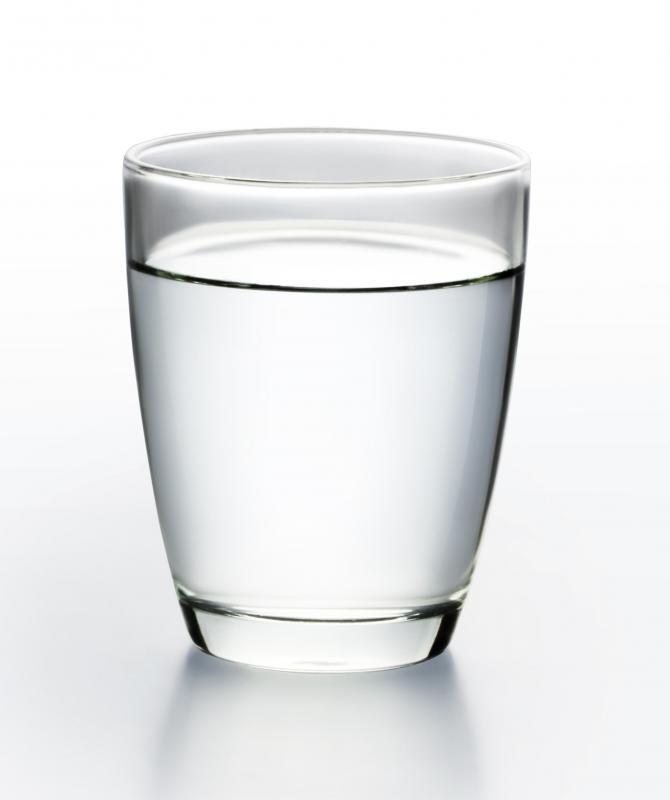At WiseGEEK, we're committed to delivering accurate, trustworthy information. Our expert-authored content is rigorously fact-checked and sourced from credible authorities. Discover how we uphold the highest standards in providing you with reliable knowledge.
What Is the Connection between Dehydration and Diabetes?
Dehydration and diabetes interact with each other, as patients with diabetes can be at increased of dehydration, and fluid loss can also make the symptoms of diabetes worse. Diabetic patients need to drink sufficient fluids to meet their water needs and should be aware of how exercise and hot weather may impact their fluid levels. It is also important to be aware that many dehydration solutions are not safe for patients with diabetes, as they contain sugars and may throw the patient's blood sugar off. Diabetics need supplies of fresh water available at all times.
One link between dehydration and diabetes can arise when a patient's blood sugar gets very high. The kidneys up their production of urine to eliminate as much sugar as possible. If the patient is not drinking enough water, she can become dangerously dehydrated. Diabetics usually experience excessive thirst because of the high blood sugar and may drink far more fluids than normal to compensate for the water loss through the kidneys.

Over time, dehydration and diabetes can lead to a condition called hyperglycemic hyperosmolar nonketotic syndrome. The patient's blood sugar gets dangerously high, the balance of fluids and salts gets out of whack, and the patient can fall into a diabetic coma. These patients cannot drink enough water to address the dehydration. This is a particular cause for concern in older patients, those with poorly controlled diabetes, and those who work or live in hot conditions.

Dehydration can also contribute to diabetes symptoms. The body tries to conserve fluids when it is dehydrated, and this can lead to a dangerous increase in blood sugar because the kidneys cannot eliminate excess glucose. It is also possible for dehydration and diabetes to run in the opposite direction, where the dehydration leads to hypoglycemia. These connections between dehydration and diabetes are important to be aware of in situations where dehydration is a risk.

Diabetic patients can reduce their risks with regular blood sugar testing to monitor their health. They should also make sure to drink water and take their diabetes medications in a timely fashion. The more controlled a patient's condition is, the less likely it will cause serious complications. Like other patients with a medical need for water and other fluids, patients with diabetes are allowed to bring water into locations where it is normally banned or limited. In sports arenas, airport security, and similar environments, patients may find it helpful to carry a medical note to document their need for extra fluids.
AS FEATURED ON:
AS FEATURED ON:

















Discussion Comments
@fBoyle-- Healthy people need to drink 2.5 to 3 liters of water per day. Diabetics need to drink more, at least 3.5 liters.
I drink more like 4 liters a day. In the summer or when I exercise, I drink a little bit more. If I drink things like tea or coffee which cause more urination, I have to drink more water to make up for it. Otherwise, I get headaches, fatigue and vision problems like you.
@ddljohn-- Type 1 diabetes causes dehydration. I think I'm always dehydrated. I have headaches a lot and I get blurry vision sometimes.
I'm not sure what the connection is between type 1 diabetes and dehydration. I'm a type 2 diabetic and my diabetes is under control with medications. I don't get dehydrated often because I always feel thirsty and sip on water throughout the day. But because I drink so much water and urinate so often, I lose a lot of minerals and electrolytes.
So even though I'm not exactly dehydrated, I feel unwell most of the time. In hot weather, it gets worse and due to loss of sodium and electrolytes, my blood pressure falls and I feel like I might faint.
Dehydration is definitely a risk for diabetics, but diabetics can have problems even when they're not dehydrated. The only solution to this is to drink electrolyte water and natural mineral soda along with regular water. These waters not only hydrate but also replace the lost minerals we need.
Post your comments